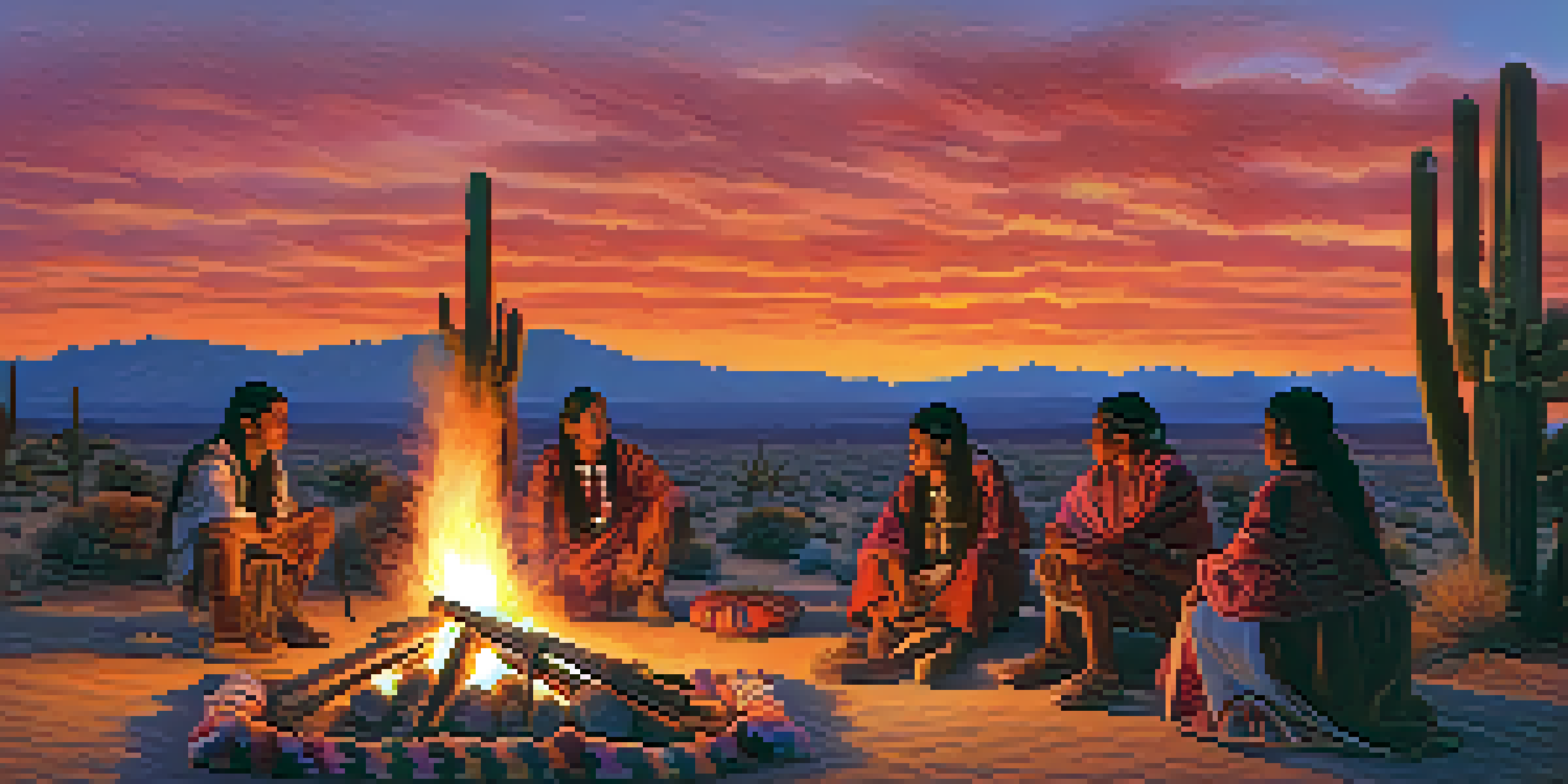Peyote as a Catalyst for Cultural Resilience in Native Tribes

Understanding Peyote and Its Historical Significance
Peyote, a small cactus native to Mexico and the southwestern United States, has been used for centuries by various Native tribes for spiritual and medicinal purposes. Its psychoactive properties have made it a cornerstone of many Indigenous spiritual practices, particularly within the Native American Church. As tribes navigate the complexities of modernity, Peyote serves not just as a sacrament but as a symbol of cultural identity.
The greatest danger in times of turbulence is not the turbulence; it is to act with yesterday's logic.
The historical significance of Peyote is deeply intertwined with the spiritual beliefs of many Indigenous peoples. For these communities, the cactus is seen as a teacher, providing insights and fostering connections to ancestors. This connection is particularly important in the face of ongoing cultural erasure and assimilation pressures.
Understanding the historical context of Peyote highlights its role in cultural resilience. Amidst a backdrop of colonization and displacement, the continued practice surrounding Peyote rituals helps maintain a sense of community and shared identity among tribes.
Peyote Rituals: A Pathway to Spiritual Connection
Peyote rituals often involve communal gatherings where participants consume the cactus in a sacred setting. These ceremonies are designed to foster spiritual growth, healing, and connection to a higher power, allowing individuals to explore their inner selves. Through singing, drumming, and prayer, these rituals create a shared space for emotional and spiritual expression.

The communal aspect of these rituals enhances social bonds within tribes, reinforcing cultural values and practices. Participants often report feelings of unity, love, and understanding during these ceremonies, which can be transformative. This sense of togetherness is crucial for maintaining cultural identity in a rapidly changing world.
Peyote: A Symbol of Cultural Identity
Peyote serves as a vital sacrament and symbol of cultural resilience for Indigenous tribes, helping them maintain their identity amidst modern challenges.
Moreover, these rituals serve as a form of resistance against cultural assimilation. By actively engaging in their traditional practices, tribes reinforce their distinct cultural narratives and challenge the dominant societal norms that threaten their existence.
Healing Through Peyote: A Therapeutic Approach
Beyond its spiritual aspects, Peyote has been recognized for its potential therapeutic benefits. Many Native individuals report using Peyote to cope with challenges such as trauma, addiction, and mental health issues. The introspective journey facilitated by Peyote can lead to profound personal insights and emotional healing.
Cultural resilience is the ability of a community to adapt and thrive amidst adversity while maintaining its cultural identity.
Research indicates that the psychoactive compounds in Peyote, particularly mescaline, may have therapeutic effects that align with modern psychology's approach to healing. For instance, the experience can lead to a greater understanding of one's emotions and past experiences, paving the way for recovery and resilience.
This therapeutic use of Peyote is particularly significant in light of the historical trauma faced by Indigenous communities. As tribes reclaim their traditional healing practices, Peyote becomes a vital tool for not just individual healing but also for collective cultural resilience.
Cultural Resilience: The Role of Traditions
Cultural resilience refers to the ability of a community to maintain its cultural identity despite external pressures. For Native tribes, this resilience is often nurtured through the practice of traditional ceremonies, including those involving Peyote. These traditions provide a framework for cultural continuity and adaptation.
By participating in Peyote rituals, community members reinforce their connection to their heritage. This connection is not just about preserving the past; it also involves adapting these practices to contemporary contexts. In this way, Peyote serves as a living tradition, evolving while remaining rooted in cultural identity.
Healing Through Peyote Rituals
Peyote rituals not only foster spiritual connection but also provide therapeutic benefits, aiding individuals in coping with trauma and mental health issues.
The importance of cultural resilience cannot be overstated, especially in today's world where Indigenous identities are frequently marginalized. Peyote rituals provide a counter-narrative to mainstream culture, asserting the value of Indigenous perspectives and practices.
Intergenerational Transmission of Knowledge
One of the key aspects of cultural resilience is the passing down of knowledge from one generation to the next. Peyote ceremonies often involve elders sharing their wisdom with younger generations, ensuring that cultural practices and values continue to thrive. This intergenerational transmission fosters a sense of belonging and continuity within the community.
In many tribes, the teachings around Peyote are not solely about its use but encompass broader lessons about life, spirituality, and community. Elders play a crucial role as mentors, guiding the youth in understanding the significance of their cultural heritage and the importance of maintaining these practices.
This connection between generations strengthens community ties and empowers younger members to embrace their identity. As they learn about Peyote and its significance, they become custodians of their culture, ensuring its survival in the face of modern challenges.
Contemporary Challenges and Cultural Survival
Despite the resilience demonstrated by Native tribes, contemporary challenges persist. Issues such as environmental degradation, legal restrictions on Peyote use, and cultural appropriation threaten the survival of traditional practices. These challenges necessitate a proactive approach to preserving cultural identity and practices surrounding Peyote.
Advocacy for the protection of Indigenous rights and sacred traditions is crucial in this context. Many tribes are working to educate the broader public about the significance of Peyote and the importance of respecting Indigenous practices. This advocacy not only helps protect their cultural heritage but also promotes a deeper understanding of Indigenous issues.
Preserving Knowledge Across Generations
Intergenerational transmission of knowledge in Peyote ceremonies empowers younger members to embrace their cultural heritage and ensure its survival.
By addressing these contemporary challenges, tribes can strengthen their cultural resilience. This involves not only protecting Peyote rituals but also fostering community solidarity and resilience against external pressures.
The Future of Peyote and Cultural Resilience
Looking ahead, the future of Peyote and its role in cultural resilience appears hopeful yet complex. As interest in Indigenous spirituality grows, there is a need for respectful engagement that honors the traditions and practices of Native tribes. This includes understanding the sacred nature of Peyote and the importance of its use within cultural contexts.
Tribes are increasingly positioning themselves to lead discussions about the use of Peyote, emphasizing the need for cultural competence and respect. By reclaiming narratives around Peyote, they can educate both Indigenous and non-Indigenous audiences about its significance and role in cultural resilience.

Ultimately, Peyote is more than just a plant; it symbolizes the ongoing journey of Indigenous peoples to preserve their identities and strengthen their communities. By prioritizing cultural resilience through Peyote, tribes can navigate the future with a renewed sense of purpose and connection.